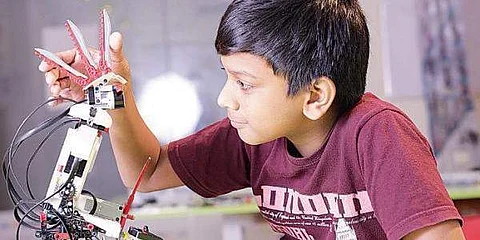

Science as a subject should not be limited to rote learning but it must be taught through applied learning, says A P Raghu who is the Manager of Outreach team from Innovation and Science Promotion Foundation (ISPF). An organisation started in Bengaluru in 2014 by Ravi Rangan S, Procheta Mallik and Vishal Bhatt, it aims to teach Science through interactive experiments that inspire innovation. Raghu says, "Most of the students who top Class XII exams fail to top CET, JEE or even NEET because of the lack of skills to apply science in solving actual problems. Therefore, the organisation has been setting up Science experiment labs in some of the government schools in Bengaluru to develop a scientific temper among kids at the school level."
As a part of these Science labs called Unlab, the team has designed activities where children can engross themselves and learn various concepts in this subject. Raghu says, "These activities change as per the class and age groups. Every experiment is customised accordingly. For instance, if a child has to study Newton's Law of Motion, then there are toolkits to demonstrate such experiments. Sometimes, these experiments are connected with Math formulae and calculations too. While setting up the labs is one part of our project, we train teachers to demonstrate various scientific phenomena and Math concepts with interactive models and toys. They will also get a proper mentorship through whom their progress will be analysed periodically and remedial measures will be suggested. This way, we have set up Unlab in more than 10 schools in Bengaluru impacting thousands of students. With the toolkit we provide, each child can make 10-54 working models and experiments in one year, with each session lasting about 90 minutes."
Since schools have been shut for more than six months now, the ISPF team has been training students online to do these experiments with materials available at home. "We don't suggest experiments related to fire or chemicals that can cause harm. We suggest simple experiments and give them worksheets to see how much they have understood or learnt from these experiments. For instance, we have designed a pen stand that helps children explore magnetic force, balanced and unbalanced forces. Showing them how photosynthesis works using curry leaves as well as baking soda, why a cloth with turmeric turns red when soaked in soap water and so on. All these experiments don't need anybody's assistance and children learn a lot when they do it themselves," explains Raghu.
Apart from working with government schools, the team has also been working with many private schools across Bengaluru and the response has been overwhelming. Furthermore, ISPF wanted to expand these Science labs and provide their Science toolkits to other states, so they collaborated with other NGOs and have spread to Tamil Nadu, Maharashtra, Gujarat and Goa, impacting more than 35,000 children and kindling their interest in Science.
